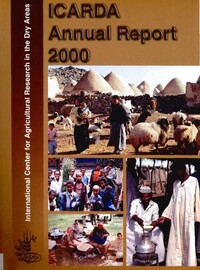ICARDA Annual Report 2000

Authors:
This Annual Report of ICARDA for 2000 is the first to reflect the new reporting structure based on the five CGIAR themes: Germplasm Enhancement, Production Systems Management, Natural Resource Management, Socioeconomics and Policy, and Institutional Strengthening. Within these themes, research is organized into 19 interlinked projects that aim to integrate, or at least harmonize, the management of different agroecosystems in the dry areas.
ICARDA uses integrated research sites in Central and West Asia and North Africa (CWANA), characterized by biophysical and socioeconomic features, to develop technology packages for wider use. Key sites include Khanasser, Syria, and Boykozon, Uzbekistan. Research combines gene management with natural resource management to create resilient crops using conventional and advanced tools such as remote sensing, GIS, biotechnology, crop modeling, and participatory research.
The Center strengthened partnerships with national agricultural research systems (NARS), focusing on biodiversity conservation, drought mitigation, poverty alleviation, and sustainable resource management. ICARDA participated in UNCCD meetings and collaborated with advanced research institutes globally. The report highlights ICARDA’s evolving research focus and thanks donors and partners for supporting its mission to serve people in dry areas.
